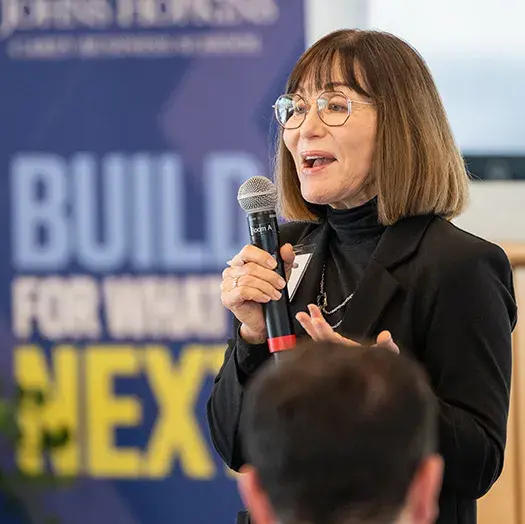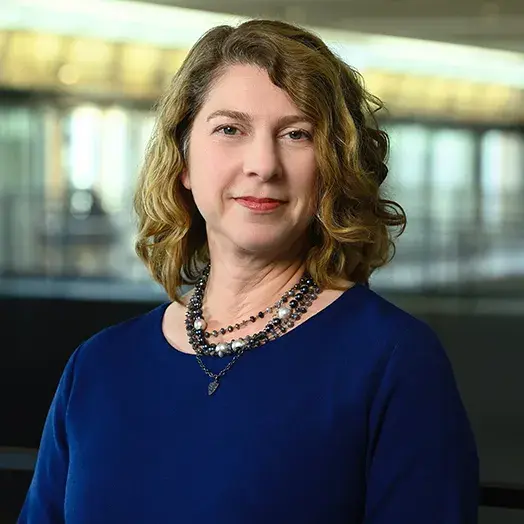
Carey students help establish first-of-its-kind tracking for vacant properties
Carey students help establish first-of-its-kind tracking for vacant properties
In January of 2022, Baltimore City lost three firefighters in a partial building collapse during a fire at a vacant home on South Stricker St. That same month, Baltimore City Solicitor Ebony Thompson took office and set out to fix the problem of the city’s 15,000 vacant properties.
Thompson turned to Johns Hopkins Carey Business School Associate Professor Jim Kyung-Soo Liew, who often looks for real-world problems to bring his finance students. Liew and the students in his Crypto-Currencies and Blockchain course studied whether blockchain could be a groundbreaking solution to Baltimore’s crisis.
“People have been trying to use blockchain for quite some time now, but nothing has caught on yet,” Liew said. “If Baltimore’s approach takes off, imagine how other cities will follow suit.”
Students’ approaches pave the way
Liew’s students presented their research to Thompson and Deputy Solicitor Stephen Salsbury. They explained how blockchain, which keeps records of transactions in elaborate networks, could track vacant properties. Then Thompson used the students’ insights in her pursuit to make Baltimore the first U.S. city to use blockchain to target and track unwanted properties, helping convert them to developers and reduce the community dangers associated with high numbers of vacant houses.
With blockchain, Baltimore will have an immutable record of the chain of custody for each property, reducing title searches and the amount of time it takes to acquire and repair vacant homes, while offering improved security of titles. Blockchain’s improved security is an added benefit, especially after a 2019 ransomware attack on Baltimore City’s computer systems paused property transfers and put such data at risk.
What’s next?
But this was just the first step to solving a complex community issue. Rehabbing and reusing the vacant properties is a whole other set of challenges—one that Carey students are also jumping in to help solve. Enter the Net Impact Conference, which focuses on community-level innovations and community engagement services.
Carey MBA candidate Fayez Ahmed served as student organizer of this year’s Net Impact Conference. Developing the conference’s case competition topic, he said, was easy.
“As most of us are students here in Baltimore and living here, we wanted this year’s conference to make a difference in the city,” Ahmed said. “Vacant properties in Baltimore have been an unsolved challenge for a long time.”
A real case for competition
So, the organizers focused the competition on building innovative financial strategies to reuse those properties and worked with the Bloomberg Center for Public Innovation at Johns Hopkins to co-author the case. Students from the University of Virginia, George Washington University, the University of Maryland, and Carey brought their best business cases to the table. One of the people at that table was Terrance Smith, the director of the Baltimore Innovation Team in Mayor Scott’s Office of Performance and Innovation.
The teams shared case plans like increasing median home prices and future tax revenues for city government, implementing health system social returns on investments spent on housing interventions, establishing a landbank authority, and more.
One of the teams representing Carey won. Their winning idea was for healthcare institutions to invest in the renovation of blighted properties and neighborhoods citywide as a preventative health initiative, and then allocate funds to developer and homeowner Community Development Financial Institutions (CDFIs). They received a $2,000 cash prize.
“The ideas and proposals shared at the conference hopefully gave Baltimore City food for thought on how they can take different approaches to solve the vacant housing problem,” said Ahmed. “There are many avenues to explore when it comes to solving community issues, so it’s important to engage fresh minds, and views and ideas from outsiders who may not have a voice at the community level. The Net Impact Conference sparked more discussions and different thought processes for relevant stakeholders.”
The Net Impact Conference is hosted each year by the Net Impact student organization at the Johns Hopkins Carey Business School, a group that actively hosts events that spark conversation, inspire others to take action, and make impact within the local community. This year’s conference was generously sponsored by The Johns Hopkins University Alumni Association, Cohn Reznick LLP., and The David Reznick Foundation.


